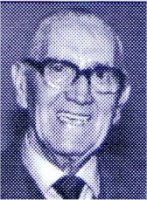PHRASES AND WORDS IN IRISH, STILL IN COMMON USE IN THE PARISHES OF CREGGAN IN 1981by Con Mac an Ghirr
A few years ago the late lamented Padraig Mac Con Ni, a native of Drumintee and a distinguished local history and Irish language scholar and a GAA enthusiast compiled a very interesting article for the Irish Press entitled Bds na Gaeilge in ndeisceart Co. Ard Mhacha (The death of Irish in South Armagh). In the article he gave a list of the last native speakers of Irish In this area and in his research he was ably assisted by Mr. John Hannon ex P.T. Glassdrummon R.I.P. and Jemmy Hughie Mor Murphy of Carnally. The latter attributed the survival of the Irish language in Carnally, to the fact that then natives from that area, who travelled annually to Lincoln in England for harvest work, always spoke Irish among themselves abroad to confuse the `ancient enemy' and at home to retain their fluency. Among his list of native speakers were Michael Hearty, Clarnagh D. 1921, his sister Mary 1926, Johnny Quinn 1923, Owen Murphy 1924, Peter Mallon and Pat Branigan 1926, Pat Donnelly 1920, Brigid Quinn 1940, 103 years old, Mrs. Mary Harvey Clonalig 1947 (90), her daughter Mary 1960, a neighbour Kate (Rock) Larkin (nee Harvey) Rathfriland and formerly of Clonalig. Without question there were many others, who lost their fluency through lack of practice, but who still had a smattering of the language and knowledge of such old songs as Uf Chill an Chreagain and Casa Can na Feadarnai. Even those who had not any knowledge of Irish knew the meaning and use of many phrases and words in Irish, without suspecting that they were Irish words at all. Among the Irish words and phrases in common use in the area twenty years ago and probably today among the senior citizens were the following avic, (a mhic), son, areesh (aris) again, amadawn (amadan) a fool. A brave day (Lá breá) a fine day, bucked (bocht) tired out, bledderine (bladant) soft talk or flattery, a battering (batarreacht) stick fighting or a beating, a boon at threshing or pulling flax (buidhean or buan) a crowd of workers, bothered (bodhar) hard of hearing, bru of the hole (bruach) the brow or edge, a barging woman (bairseach) a scolding woman, the banshee (bean sidhe) a fairy woman, a bonnack of bread (bonnóg arain) a cake of home made bread, a bottle of hay (bata? 1) a bundle of hay, agin (i gcionn) by the end of, a brash at churning (brais) a turn, footering (ag útamail) messing about, bow legged (bórach), backan (bácan) a door hinge, brogs (bróga) boots or shoes, bunty (bunta) short-tailed. Casted (céasta) very tired, clabar (clabar) dirt, a slabber (clabaire) a foolish talkative person, carron (earn) a heap, car (cár) sneering mouth, cludog (cludóg) a hiding place for eggs, to cap something (ceap) to stop, ciotog (ciotóg) the left hand in foot, the basa cam (basadh cam) the crooked turn, cragthor (creatur) a poor sick person, crusty (crosta) cross, crank (crangaid) a sore sour person, the pig craw (cró) or the byre, the cockles of his heart (cochall) the centre of his heart, can't talk (ceannt) street traders unseemly language from ceannt an auction, cabah (cabach) a shrewd person, crack (trait) pleasant conversation, tiff (ciof) sport or fun, crags (craga) big hands, crubs (cruba) pig's feet, call (call) need, to trig your toe (cnag or cniog) a blow or rap, caley (céilí) a visit, clout (clabhta) a blow or thump, a card (ceardai) a trickster. Gerning (ag gearán) complaining, grus (gnuís) a sour face, gersha (girrseach) a young girl, gason (gasúr) a young boy, giostra (giostaire) a gabby gistra an old fashioned talkative child, giblets (giobalach) torn clothes, a gulpan (gilpan) a greedy person, gunc (geanc) a snub nose or snub, greesha (gríosach) ashes of turf, gibrish (gibirih) foolish talk. Langle (laincis) the tying on a goat, a lacing (1éasadh) a beating, a halyon (aillean) a big rough person, a hesp (easpan) a scolding old woman, blamas (plamás) coaxing talk, prackas (prácás) a mess, a miley cow (maol) bald or without horns (a polly), moidered (measeán mearaí) bewilderd, he has no mess or money (meas) esteem or regard, Musha musha (a Mhuise) well well, meela murder (míle) a thousand murders, a roughness of food (rachmas) plenty, cead meela faille róat (a hundred thousand welcomes), a bucky briar (mucoír) rose hip briar, pus (pus) a sulky face, póg moh hone (póg mo thoín) usually rudely translated but simply means kiss my bottom, puck (poc) a blow of a stick. Stulk (staile) a stubbern person, sciggling (scigil) foolish laughter, skilly eyed (fior shuileach) eyes not straight, a skiff of rain (cioth) a shower, slane turf (turf cut with a sledn - a turf cutting spade,) skelp (scealp) a blow, to take a chip out of wood smiddereens (smiderini) little pieces, kibosh (caidp bais) the cap of death or the finish, sim (suim) interest in, spree (sprasi) fun, snag (a gasp of breath) a surprize, to twig something (tuig) to understand, twang (teanga) tongue - a way of speaking, will you whisth (eist) listen or shut up, whillabulo (ruille buille) row or confusion, rulya (ruille) a row, teeming the potatoes or teeming rain (ag taomadh) draining boiled potatoes or raining heavily. Then there are the names of places Corismood. Bunawar (bun an Bholhair) the bottom of the road, The Bawan (Bathdun) a cluster of houses. The Carcra (Carraigreach) the rocky place. I'm sure there are many more which could be unearthed with a little research. Go n-eiri an bothar libh. |